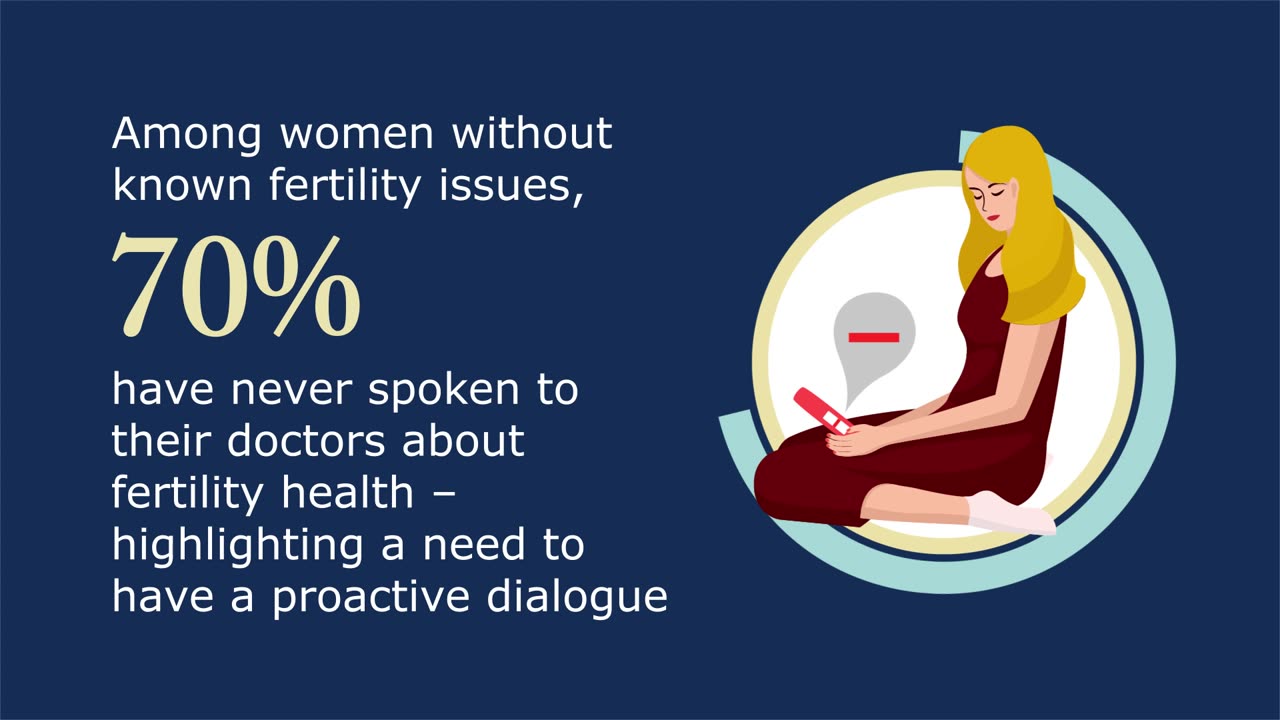Premium Only Content

Survey reveals knowledge gap in fertility issues among women
New research reveals a gap in fertility education for American women including basics of reproductive health, a lack of conversation between women and their healthcare providers about their fertility and misunderstandings around advanced maternal age.
The survey of 2,000 American women aged 18 to 40 showed that seven in 10 (70%) of respondents who have not faced fertility issues before, note that they have never had a conversation with their primary care doctors, obstetricians or gynecologists about their fertility.
Reproductive health topics that have been discussed with doctors by the full group of those surveyed include birth control pills (46%), vaginal health (39%) and how menstrual cycles work (33%).
This is compared to topics on fertility health that have been discussed, like IVF treatment (5%) and IUI (intrauterine insemination) treatments (4%).
Conducted by Talker Research on behalf of The Prelude Network fertility clinics for Women’s Health month in May, the survey revealed that slightly over half of respondents (55%) believe they know enough about sexual intercourse to make decisions about their reproductive future, with a remaining 45% who don’t feel the same.
“The data shows that we as a society aren’t talking enough about female fertility health, and without those conversations, women don’t have the information they need to make empowered, educated decisions about their family building options,” says Lindsey Rabaut, Chief Marketing Officer at Inception Fertility, the parent company of The Prelude Network. “The great news is that there are opportunities to fill in this information gap. It starts with raising awareness about how fertility works and driving home the message that fertility health is women’s health. I wish I had been told more when I was 29 and just starting my career.”
Women feel even less confident about their knowledge of sexually transmitted diseases (28%) or fertility-related topics such as IVF treatment (6%), egg freezing (5%) and sperm donor treatment (3%).
Between female and male bodies, respondents were asked which one they think is the most frequent cause of fertility-related issues.
Results showed that 31% of respondents believe a woman’s body is the cause of these issues compared to just 4% who said male.
More than half (53%) of American women also mistakenly believe that the “advanced maternal age” starts before 35 years old, and 41% feel pressure to have children before this age.
Sixty percent of respondents also think of their biological clock as a countdown to when they can no longer conceive a child and 28% expressed “always” or “often” feeling anxious when thinking about their biological clock.
This has left many feeling regretful, as 32% of millennial women wish that they had planned to conceive a child sooner.
As a result, nearly a quarter of women surveyed (24%) feel that it’s too late, believing at this point in their life, they are not able to have a child.
The reasons they believe this include concern about their health (23%), being too stressed (22%) and having a reproductive disease (19%) — such as endometriosis, a fallopian tube disorder or pelvic inflammatory disease.
Women are also indicating that they are worried about potentially facing fertility issues in the future (38%), with four in 10 women (41%) under age 35 expressing worry about this.
However, Gen Z women are slightly more willing to speak to other women about fertility issues (64%), compared to millennials (61%).
This openness is also shown in their perspectives on fertility treatments with over half (57%) of those surveyed under age 35 expressing that they are more likely to consider a treatment if they are unable to conceive a child naturally, while 47% of those older than age 35 said the same.
“A clear takeaway from this survey is that women express anxiety about their future fertility, but we can lessen this distress – and do a better job of supporting them in their fertility journeys – through education,” says Alice Domar, PhD, Chief Compassion Officer at Inception Fertility, the parent company of The Prelude Network, and the Director of the Inception Research Institute. “By understanding their reproductive health and the family building options that are available today, women can be more proactive in safeguarding their fertility health and increasing their odds of an easy conception and uneventful pregnancy.”
Survey methodology:
This random double-opt-in survey of 2,000 American women aged 18 - 40 was commissioned by Inception Fertility between March 29 and April 8, 2024. It was conducted by market research company Talker Research, whose team members are members of the Market Research Society (MRS) and the European Society for Opinion and Marketing Research (ESOMAR).
-
 0:59
0:59
SWNS
3 days agoParents reveal why they want their kids to play with toys
261 -
 LIVE
LIVE
Right Side Broadcasting Network
10 days agoLIVE REPLAY: President Donald J. Trump Keynotes TPUSA’s AmFest 2024 Conference - 12/22/24
4,579 watching -
 4:31
4:31
CoachTY
1 day ago $1.09 earnedCOINBASE AND DESCI !!!!
164K11 -
 10:02
10:02
MichaelBisping
1 day agoBISPING: "Was FURY ROBBED?!" | Oleksandr Usyk vs Tyson Fury 2 INSTANT REACTION
90.2K13 -
 8:08
8:08
Guns & Gadgets 2nd Amendment News
2 days ago16 States Join Forces To Sue Firearm Manufacturers Out of Business - 1st Target = GLOCK
114K88 -
 10:17
10:17
Dermatologist Dr. Dustin Portela
2 days ago $1.21 earnedOlay Cleansing Melts: Dermatologist's Honest Review
151K14 -
 1:02:20
1:02:20
Trumpet Daily
2 days ago $12.42 earnedObama’s Fake World Comes Crashing Down - Trumpet Daily | Dec. 20, 2024
107K68 -
 6:29
6:29
BIG NEM
1 day agoCultivating God Mode: Ancient Taoist NoFap Practices
78.9K20 -
 30:53
30:53
Uncommon Sense In Current Times
2 days ago $0.86 earned"Pardon or Peril? How Biden’s Clemency Actions Could Backfire"
90.8K10 -
 40:01
40:01
CarlCrusher
1 day agoSkinwalker Encounters in the Haunted Canyons of Magic Mesa - ep 4
83K10